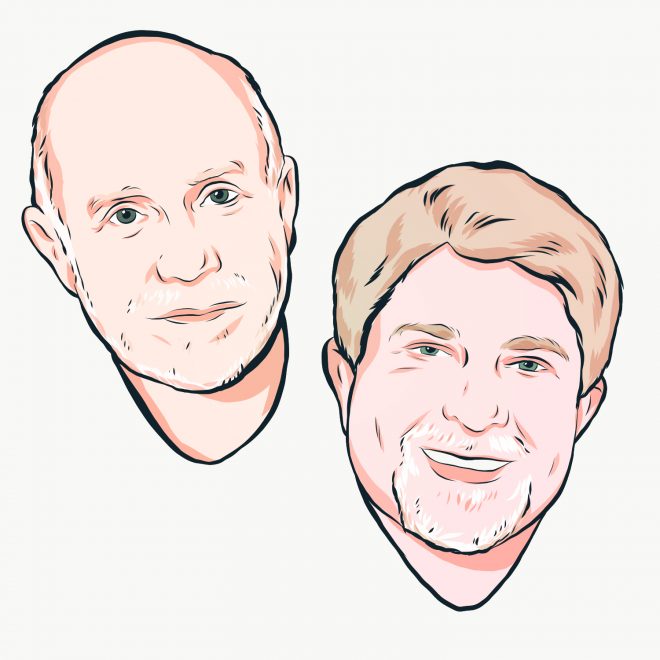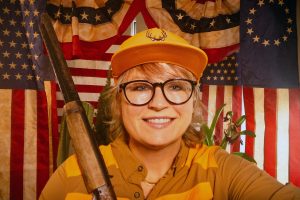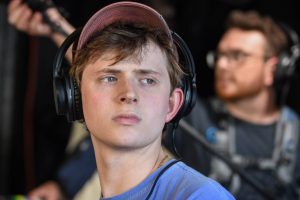THE LEGACY ISSUE: The Documentarians

Larry Foley and Dale Carpenter have worked together for over 40 years producing news in studios, teaching students in classrooms and editing their next documentary film in dark rooms (and likely preparing for the next one simultaneously). Not only have they been great film partners over the years, they’ll tell you the true success story lies in their friendship. Larry and Dale feel a real privilege as journalists and storytellers, documenting people’s lives over the years through their captivating films. From their early days producing at Channel 7 to teaching melding minds at the University of Arkansas, they’ve grown as friends and professionals: Larry and Dale have each other’s backs, all the way to the end of the reel.
How many films have you guys made together and what is the workflow dynamic in terms of who takes lead?
LARRY / I think the thing that has always worked about us working together is that we have—and I’ve said this before—we have mutual respect for one another. And as Dale has said, I’m kind of quoting him here. We’re not the same. We bring something different to the table. And we bring something to the table when we’re working together. We have a partnership that works. I know I have always enjoyed working with Dale. […] He’s one of my best friends. He’s more like a brother than a friend. And I’ve never worked on anything with him that I didn’t enjoy working on. I mean, one of the things is that I know I get to work with him in the field.
DALE / Well, I think one thing that, like Larry said, we’re different and that’s because we kind of got started in the business coming from a different point of view and a different skill set. I mean, I wanted to be a shooter, I wanted to be with the camera, and I’ve never really given that up. Even though later on, I started producing films on my own. I always wanted to shoot them and edit them. So the camera kind of brought me into it. And when I met Larry at Channel Seven, we would always, when we do stories, I was the shooter, he was the reporter. And we had a lot of fun just doing those little short stories, but then we didn’t realize that later on, we were going to get into a lot more of that kind of stuff.
But early on, it was just always fun. Like Larry said, we just always got along real well. And we had all that stuff in common. We were coaching Little League baseball together and stuff like that. So we just, you know, had a lot going on in our lives that interconnected. But at AETN, […] I remember when I first got the courage … and got the opportunity you know, the first thing I did was start running my scripts by Larry, because I’d never written a script before. And he helped me so much and [showed me] how to write. I knew how to shoot and edit, and I knew how to tell a story, but I just didn’t feel confident writing.
Why did you decide to teach documentary filmmaking in journalism school, and what is the mentoring relationship like with your students?
LARRY / When I see you guys out there doing your own projects, [or] when a student comes through and they produced their first year film and they produced their thesis film and they’re defending, my comment has always been the same: “But what are you gonna work on next?” You know, because for Dale and I, we’ve always worked on something next and you’re not really a filmmaker until you’re constantly working on film projects, figuring that the one that you’re working on now, you want to make it the best you can make it. Hopefully it’ll be the best thing you’ve ever done because it’s the only one that you’re working on right now. But you know, as far as why we taught this in journalism, you can teach documentary film from any number of disciplines, but the reason why we taught it in journalism is because we were journalism professors and and we really wanted to create a documentary film focus, and that’s what we’ve done in the master’s program.
DALE / You know, a lot of times a student would come in and just wanted to talk to me about filmmaking. And they were like, well, you know, how do you get into it? You know? And I would say, “Well, are you making a film right now? Are you working on anything right now?” Even if they just had no experience really, because, I mean, I think today there’s really no excuse. We had some excuses back in my day because I mean, cameras are like $60,000 and access to editing equipment was you just had to work at a TV station or our film production. But you have no, you don’t have those obstacles now. So it’s, you know, sky’s the limit.
What’s been some of the most important lessons that you’ve given your students over the years?
LARRY / When you’re working on a project, [or] when you’re working on a film, that’s the only film you’re working on right now, more than likely, and the need to make that one as good as you can make it […]—making sure you get the story right, and you get the focus narrowed, all those things matter—make the project. Every project is “the project.”
DALE / We don’t usually have a budget to travel. Sometimes we’ve been lucky and been able to do that. But some of the best films I’ve made have just been little small subjects that you just have. There’s so much in it because humans, you know, that’s where the stories are and they’re all over the place. So I think that’s another thing that a lot of times students didn’t realize that you can tell a great story just by going next door sometimes.





Comments